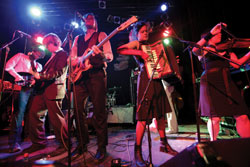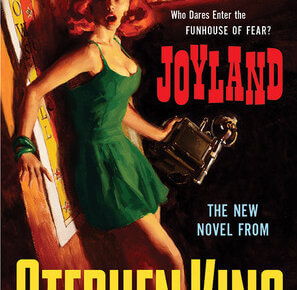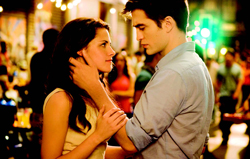Where does “indie rock” end and “freakin’ huge rock band” begin? For Arcade Fire, the biggest little band in the world right now, you could argue multiple points. Some might say it’s selling out Madison Square Garden (twice), and others would argue winning Album of the Year at the Grammy’s is the point of no return. Which one is it?
Well, neither. The real tipping point – the moment where Arcade Fire really embraced being larger than life – is “Reflektor,” the group’s flashiest, grandest, and most bloated album to date. And guess what? It’s awesome for it!
“Big” is nothing new for a group like Arcade Fire. The band’s penchant for diverse instrumentation and fitting as many band members as you can on one stage certainly doesn’t scream modest, and their albums, from their profound, genre-defining debut “Funeral” to their Grammy-winning achievement “The Suburbs,” exhibited emotional and musical maximalism at its most sincere.
Yet when Arcade Fire goes the distance on “Reflektor,” their genre-bending, meticulously produced new double-album, it feels different than it did in the past. Arcade Fire’s previous work had a sort of underdog-level grandness to them, like this “little” indie band was pushing itself as far as they can go and constantly beating the odds to achieve greatness.
Not so with “Reflektor.” The stakes alone are clearly bigger, as Arcade Fire is almost a household name, and at this point, the group could make any album they wanted to. Listening to Reflektor, you get the feeling that Arcade Fire not only knows this, but embraces it, as “Reflektor,” with its studio pomp and unrestrained scope, is the kind of record rock bands usually only make once they know they’ve established themselves. But in no way does that mean it’s a safe record.
Produced by ex-LCD Soundsystem wunderkind James Murphy and taking in such influences as funk, disco, and even Caribbean pop, “Reflektor” is an entirely different record than anything the band has put out before, as the group has never before blended such styles into their sound so tenaciously.
But what makes “Reflektor” work, despite its tracks’ occasionally excessive run times, is that the group never really loses sight of who they were, as Arcade Fire’s “little-indie-band-that-could” vitality is never lost amongst the swirling vortex that is “Reflektor.”
Perhaps the best place to start would be the album’s title track, also the album’s first single and opening track. With its grooving, layered percussion and lively sonic accoutrements, “Reflektor” is the sound of a band fully embracing a whole new direction – and absolutely owning it. It channels some pretty clear influences (think “Station to Station” era Bowie for starters) but with production in the hands of Murphy, whose expertise is making the sounds of old sound fresh, as these borrowed influences have rarely sounded more vital.
Many aspects of the title track hint at what’s in store for much of the album’s double-disc span. For instance, “Reflektor” is easily the most rhythmic album Arcade Fire has ever made, even when the group operates at their most conventional. Standout tracks like “We Exist” and “Afterlife,” for instance, could pass for classic Arcade Fire at their most basic level, but the added dosage of funk brought out through their propulsive rhythm sections brings out an enticing, neon-disco glow that gives them a whole new flavor.
The track that really sells this aesthetic, however, is the epic “Here Comes the Night.” Though it may sound a bit cheesy with its cool-blue Haitian pop sensibilities, the track is easily one of the best that Arcade Fire has written period, as the song effortlessly cruises back and forth from a hazy, lackadaisical groove to an enormous, rapturous swell of guitars and tribal drums that elevate the album to its grandest highs. It’s the sound of a great band taking in new, refreshing influences at an almost spiritual level, and its tones of fun at that.
That’s another thing about “Reflektor” which makes it stand out – this is easily the most “fun” record that Arcade Fire has made by a long shot. Don’t get me wrong, I wouldn’t want the bands previous works to be any less serious and emotionally heavy than they were, but it’s definitely refreshing to hear the group pepper in some more light-hearted doses of personality between tracks, or even make music that’s just a blast to dance to.
“Reflektor” is a long album – long enough to stretch its span over two discs. But this double-album approach isn’t done arbitrarily, as each disc presents itself in a very distinct way while also having enough in common to form one greater whole.
Disc one is certainly the more “song-oriented” half on “Reflektor,” as the majority of the album’s catchiest and most concise moments are located here. Disc one also contains the most straightforward “rock” songs on the album, as energetic tracks like “Normal Person” and “Joan of Arc” are carried by big guitar riffs and big choruses.
It’s debatable how effective Arcade Fire are when operating in traditional rock form (especially when there’s so much else going on in this album), but these example still implement plenty of the band’s triumphant grandeur to make up for sounding a bit conventional.
Disc two, however, is where things get a bit looser and longer. Disc two is really where the production shines above all else, as tracks like the aural “Awful Sound (Oh Eurydice)” and “It’s Never Over (Oh Orpheus)” are sumptuous and dense worlds of vivid, glowing sound, though the hooks don’t hit nearly as hard as they do on the first half.
This half of the LP can test one’s patience, however, as the majority of songs on this disc fall within the six minute range or more. Some tracks, like “Awful Sound” and “Afterlife,” work well to justify such time lengths, but others, like the slightly monotonous “Porno” and the 11-minute closer “Supersymmetry,” which is beautiful for its first half, but ends on five minutes of random noise gurgles, tend to overstay their welcome.
I’ve gone a long time without mentioning the albums lyrics, which says a lot considering how much of a focal point singer Win Butler’s words were on previous releases. But while the lyrics on “Reflektor” are still good – albeit a bit more simplified – they tend to take a back seat this time around for the meticulously crafted music the band dishes out throughout both discs, and the trade-off seems well worth it.
The hype for this record was monumental – so much so that things could have easily gone ugly had the band not delivered. But while “Reflektor” might be a slightly difficult record at times, it’s nonetheless incredibly enjoyable front to back, and well worth putting in the effort to explore it’s unique halves and losing yourself in the disco ball-gleam of its towering whole.



